 Petzlover
Petzlover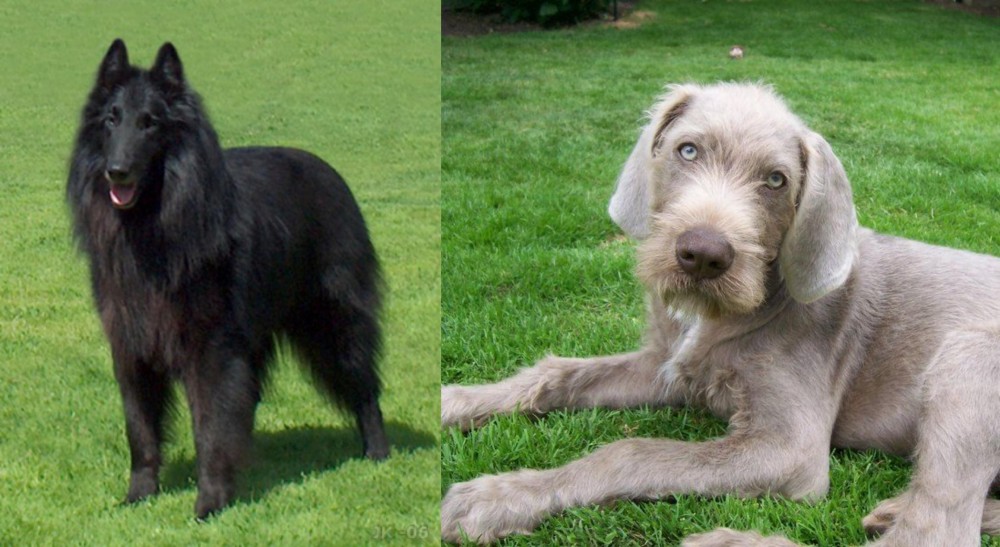 Belgian Shepherd Dog (Groenendael) is originated from Belgium but Slovakian Rough Haired Pointer is originated from Slovakia. Both Belgian Shepherd Dog (Groenendael) and Slovakian Rough Haired Pointer are having almost same height. Both Belgian Shepherd Dog (Groenendael) and Slovakian Rough Haired Pointer are having almost same weight. Both Belgian Shepherd Dog (Groenendael) and Slovakian Rough Haired Pointer has almost same life span. Belgian Shepherd Dog (Groenendael) may have more litter size than Slovakian Rough Haired Pointer. Belgian Shepherd Dog (Groenendael) requires High Maintenance. But Slovakian Rough Haired Pointer requires Low Maintenance
Belgian Shepherd Dog (Groenendael) is originated from Belgium but Slovakian Rough Haired Pointer is originated from Slovakia. Both Belgian Shepherd Dog (Groenendael) and Slovakian Rough Haired Pointer are having almost same height. Both Belgian Shepherd Dog (Groenendael) and Slovakian Rough Haired Pointer are having almost same weight. Both Belgian Shepherd Dog (Groenendael) and Slovakian Rough Haired Pointer has almost same life span. Belgian Shepherd Dog (Groenendael) may have more litter size than Slovakian Rough Haired Pointer. Belgian Shepherd Dog (Groenendael) requires High Maintenance. But Slovakian Rough Haired Pointer requires Low Maintenance
 Looking much like a pitch black German Shepherd dog, the Belgian Shepherd is a beautiful looking dog. Their roots go back to the 1800s to Groenendael, Belgium. This is where they were bred by a certain Nicolas Rose in 1910. The Groenendael is one of four different Belgian Sheepdog varieties but the Groenendael is sometimes treated as a distinct breed.
Looking much like a pitch black German Shepherd dog, the Belgian Shepherd is a beautiful looking dog. Their roots go back to the 1800s to Groenendael, Belgium. This is where they were bred by a certain Nicolas Rose in 1910. The Groenendael is one of four different Belgian Sheepdog varieties but the Groenendael is sometimes treated as a distinct breed.
They have always been used for their intelligence, serving for instance in the police force and being message carriers in war situations. Originally, Belgian Shepherds were used to herd livestock. It was in 1911 that the Groenendael was registered in the United States, and not much later the first Belgian Sheepdog Club of America formed. The breed was recognized by the American Kennel Club (AKC) in 1912.
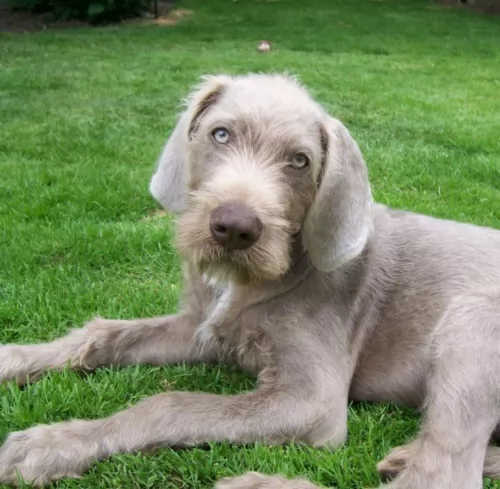 The Slovakian Rough Haired Pointer is a gundog from Slovakia. The dog came about by crossing the Cesky Fousek, German Wirehaired Pointers and Weimaraners. Other names for this dog include Slovensky Hrubosrsky Stavac.
The Slovakian Rough Haired Pointer is a gundog from Slovakia. The dog came about by crossing the Cesky Fousek, German Wirehaired Pointers and Weimaraners. Other names for this dog include Slovensky Hrubosrsky Stavac.
Developers were looking for a dog with good stamina – a dog capable of tracking hares and birds. The dog was first introduced into the United Kingdom in 1997.
 With his alert, bright brown eyes, the Groenendael, referred to often as the Belgian Sheepdog, has erect ears with a long, feathered tail. The straight, strong legs are also feathered. He is well proportioned, athletic and strong. He has a dense double coat, and this working dog’s coat is black, but you sometimes find some small white markings around his paws and muzzle. The size of the Groenendael is roughly 60-66cm at the withers with the females sometimes being slightly smaller. The weight of the dog is roughly 25–30 kilograms.
With his alert, bright brown eyes, the Groenendael, referred to often as the Belgian Sheepdog, has erect ears with a long, feathered tail. The straight, strong legs are also feathered. He is well proportioned, athletic and strong. He has a dense double coat, and this working dog’s coat is black, but you sometimes find some small white markings around his paws and muzzle. The size of the Groenendael is roughly 60-66cm at the withers with the females sometimes being slightly smaller. The weight of the dog is roughly 25–30 kilograms.
The Groenendael is an active, intelligent breed and training and socializing will be necessary to ensure he knows how to behave around his human family. He is a big, social dog and won’t do well when left alone day after day in the back yard. In fact he may even show signs of separation anxiety if you leave him indefinitely. He makes for an excellent family dog, just loving their companionship and he becomes very protective of them.
He is used to making use of his intelligence and therefore he will need mental stimulation as opposed to lying around all day. He gets on well with adults, children and other pets, but he needs to grow up with children and not be put among children when he is already an adult. He is loyal and loving to his human family, forming a deep bond, especially with just one member of the family.
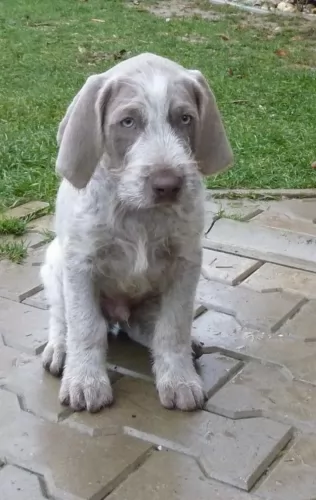 The Slovakian Rough Haired Pointer has got some looks from each of the dogs he was derived from. He is a fairly large dog and the coat is short to medium length and harsh and wiry and he has some additional hair around the face area.
The Slovakian Rough Haired Pointer has got some looks from each of the dogs he was derived from. He is a fairly large dog and the coat is short to medium length and harsh and wiry and he has some additional hair around the face area.
Most times the coat is a grey-brown shade. The ears are medium length and floppy and the tail is mostly docked at 50% of natural length, although these days it is often left long. It is carried downwards when at rest but raised when in action.
This is an energetic dog that is going to need a lot of exercise, so he won’t suit living with people who aren't active. He just loves to be outside and will thrive on a farm.
He is good with children and other dogs, but training and socialization should be provided for this dog. He is intelligent and will learn easily.
They’re affectionate dogs and their social nature makes them ideal for lively families. Because he is so active he is best suited for living in the suburbs or the countryside as opposed to living on a small property in the city.
 Your Belgian Shepherd is an intelligent, active, loyal companion for you. He is highly intelligent too, and will need the right owner who can meet his energetic needs. He therefore wouldn’t do well with in a small place where the owners are couch potatoes. He is a working dog and will require being kept busy.
Your Belgian Shepherd is an intelligent, active, loyal companion for you. He is highly intelligent too, and will need the right owner who can meet his energetic needs. He therefore wouldn’t do well with in a small place where the owners are couch potatoes. He is a working dog and will require being kept busy.
Provide him with good food, look after that thick, lustrous coat of his, provide him with a warm, dry place to sleep and plenty of exercise, love and attention and he will turn out to be the wonderful pet that makes him such a popular breed.
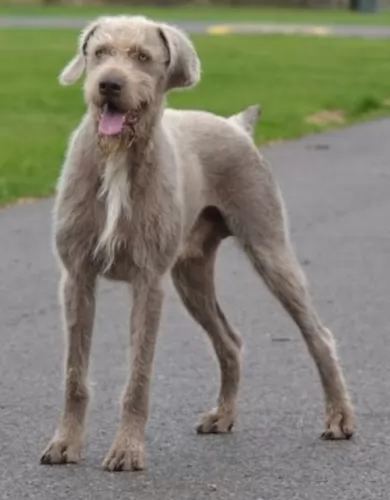 People who have owned these dogs rave about their loyalty and affection. They’re also intelligent and become very well behaved as they are dogs that also want to please their owners.
People who have owned these dogs rave about their loyalty and affection. They’re also intelligent and become very well behaved as they are dogs that also want to please their owners.
They’re gentle dogs too, just wanting to be loved by their human family and craving attention.
They’re also regarded as low maintenance pets and all these positive aspects of this dog make him a splendid choice if you're looking for a wonderful pet and companion
 The Belgian Groenendael is a healthy, strong breed with no major health problems and with an average lifespan of 12-14 years.
The Belgian Groenendael is a healthy, strong breed with no major health problems and with an average lifespan of 12-14 years.
As with every dog breed, there will be some health issues to be aware of. Skin allergies, epilepsy, eye problems and hip- and joint dysplasia are some areas to look out for
Dental disease for instance, is a common problem with pets, and your Belgian Shepherd can have serious problems with their teeth. Tartar build-up on the teeth ca take you down a trail of infections and gum disease. If you don’t want to make use of a special canine toothbrush and toothpaste, your vet will do it for you.
Your Groenendael will also be susceptible to ticks, fleas and bacterial and viral infections. As a puppy of 6 – 8 weeks, vaccinations for parvo, rabies, and distemper will be necessary. You’ll also need to be generally watching your pet’s health and to get him to the vet when he shows signs of being run-down and ill.
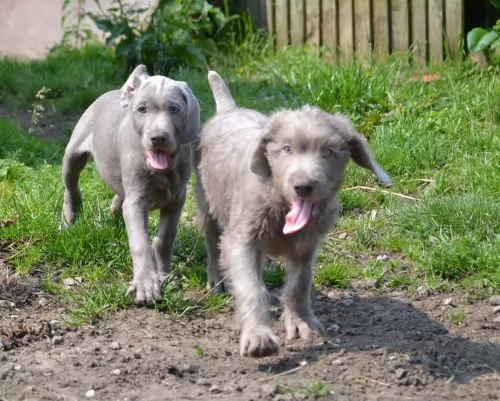 Your Slovakian Rough Haired Pointer can reach 14 or 15 years of age if he is looked after well but hip dysplasia is a threat for any dog.
Your Slovakian Rough Haired Pointer can reach 14 or 15 years of age if he is looked after well but hip dysplasia is a threat for any dog.
Any aged dog can be affected and this mobility disease is caused when the hip joint develops abnormally. Although hip dysplasia is genetic, environmental factors can also play a part. The idea is to get treatment from the vet so that your canine friend isn’t in pain.
This can cause so many problems in the body and not just the teeth. Have your dog’s teeth checked regularly and have them cleaned.
Your dog can have neck or back pain from this ailment, occurring when the discs and vertebrae of the spine become infected. Provide your dog with healthy food to ensure a strong immune system to fight off diseases like this.
 The Groenendael has a double coat and because it is also fairly long, his black coat may well be high maintenance and brushing every 2nd day will be necessary to keep the coat unmatted and to also get rid of those loose hairs. In fact, heavy shedding is part of this breed’s life and while heavy shedding happens twice a year, light shedding continues throughout the year. Sometimes is may be necessary to send him to a dog grooming parlour to snip his hair and to wash it.
The Groenendael has a double coat and because it is also fairly long, his black coat may well be high maintenance and brushing every 2nd day will be necessary to keep the coat unmatted and to also get rid of those loose hairs. In fact, heavy shedding is part of this breed’s life and while heavy shedding happens twice a year, light shedding continues throughout the year. Sometimes is may be necessary to send him to a dog grooming parlour to snip his hair and to wash it.
A healthy, quality diet it absolutely imperative. Speak to your vet about the best kind of wet- or dry food suited to an energetic breed like this and appropriate to his age. You need to include raw meat into your pets diet every day now and then to avoid skin problems. Always ensure a bowl of clean, cool water is available, The bowl will need to be washed out every other day.
make sure his ears are cleaned. Once again you have to be careful when prodding in a dog’s ear and your veterinarian will show you how.
keep him well exercised with long walks and ball games.